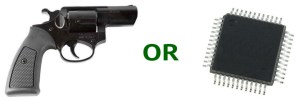Tags
There are many who relish the accuracy of chip timing, as a measure of exactly what their time was for a particular distance. Indeed, the technology that has become commonplace in competitive running is a great thing. For many purists, however, trying to compare races run “pre-chip” with those using chip timing is an undeniable mystery—very much like comparing apples and oranges. Both are fruit but very different from one another.
Creek Road Runners, from its earliest days (“prehistoric” in terms of timing technology—e.g., the use of a stopwatch), has held to a standard of posting “gun times,” as opposed to “chip times” for just this reason. It is fair to compare gun times over the years, though they don’t necessarily reflect accurate time over the stated distance. Who’s to say what one’s chip time would have been in a race of tens of thousands back in the day, if it took up to a few minutes after the gun went off just to get to the starting line?
Today, nearly all race organizers/timers do what is easiest and most efficient in posting results, i.e., using chip times, which is totally understandable. However, how do race directors decide who earns awards in various competitive categories? This can be quite paradoxical.
Speaking of paradox, CRR Bill Rose competed in the Grape Stomper cross-country 5K this summer at Paradocx Vineyards in nearby Pennsylvania. Finishing eighth overall, Rose won his age group. The paradox involved here is that Rose’s chip time was actually faster than the competitor who finished just two seconds ahead of him and who walked away with the award for fastest men’s masters runner—a more prestigious accolade, to be sure.
Upon further inspection, there were a number of inconsistencies in how runners were ranked—most placed strictly according to chip time, and yet some weren’t, like Rose, who turned in a 23:13.
CRR Mark Deshon remembers a 5K several years back, at the finish of which he was certain to have won his age group, having not seen his main rival at any point during the race. Upon checking the results board, he had placed second, not first. How might this have happened? Well, he found out that his competitor, who gladly accepted the age-group win, actually had a faster chip time but had spent too long in the Porta-Potty and had gotten to the starting line about 45 seconds after the gun had sounded.
So, this illustrates a problem with competitions, which are essentially what “races” are. One can complain about Creek Road Runners’ stance with respect to not posting the faster (i.e., chip) time in its race results articles, but we’ll argue that when the gun sounds, the official clock begins, no matter where you are in relation to the starting line—even if you’re still in the Porta-Potty!



